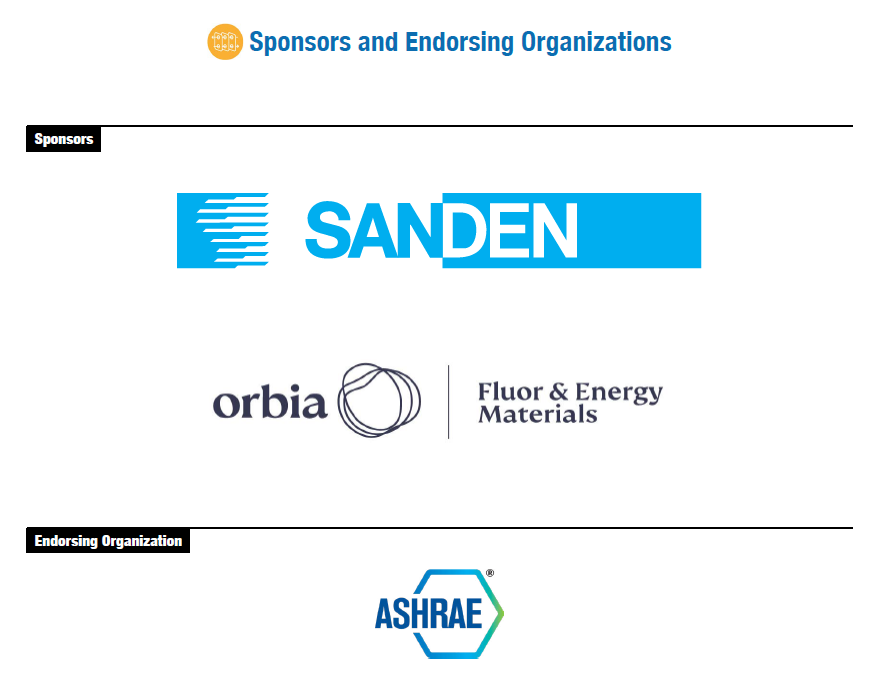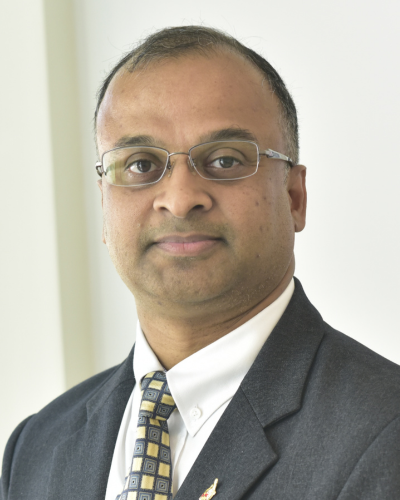
Vikrant C. Aute is a research professor and director of the University of Maryland Center for Environmental Energy Engineering, a leader in HVAC&R innovation. Dr. Aute has over 25 years of experience in the development of modeling and optimization algorithms for thermal systems. His research focuses on heat exchanger innovation, thermal storage, multidisciplinary optimization, and the application of artificial intelligence and machine learning to improve HVAC&R systems. He spearheads the development of modeling and optimization platforms that transform the way HVAC&R components and systems are designed. His industrial experience includes work at Thermax Ltd.(India), Tata Infotech Ltd. (India) and Daikin Industries Ltd. (Japan).
He is a Fellow of the American Society of Mechanical Engineers and ASHRAE. He is an active member of ASHRAE and has served on multiple technical, standards and standing committees as voting member. He is a certified Professional Scrum Master and a Microsoft Certified Professional. He received the 2024 Dean's Outstanding Performance Award for Professional Track Faculty from the A. James Clark School of Engineering at the University of Maryland.
Presentation Abstract:
Reimagining Heat Exchangers for Space Conditioning, Refrigeration and Power Generation
Heat exchangers are essential components in cooling, heating, refrigeration and power generation systems. They contribute significantly to thermodynamic losses and are responsible for holding the refrigerant charge. For over 50 years, researchers have focused on developing compact heat exchangers with high efficiency and reduced working-fluid charge, independent of recent charge limits on flammable refrigerants. Recently, techniques such as machine learning and artificial intelligence have been employed to create innovative designs. While these advancements are promising, there are substantial challenges to overcome before these new designs can be mass-produced. This talk will begin with a literature review on approaches for minimizing heat exchanger charge and innovating designs. A case study will be presented that illustrates a multiscale modeling and optimization approach, which aims to overcome some limitations of traditional topology optimization methods in generating novel and viable designs. The talk will conclude with a discussion on future research directions in this field.
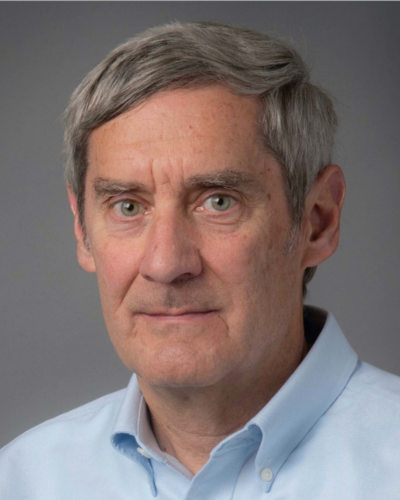
Mark O. McLinden is a research chemical engineer for the National Institute of Standards and Technology (NIST), in Boulder, Colo. He received his B.S. degree from the University of Missouri-Columbia and M.S. and Ph.D. degrees from the University of Wisconsin-Madison, all in chemical engineering. He joined what was then the National Bureau of Standards (NBS) in 1984 and worked in the Thermal Machinery Group of NBS–Gaithersburg, where he developed a nist-equation of state for refrigerant mixtures, carried out analytical studies on the optimum thermodynamic characteristics of refrigerants and constructed an experimental apparatus to measure evaporative heat transfer coefficients. He joined the Thermophysical Properties Division of NIST in Boulder in 1988, where his research through the 1990s focused on the properties of alternatives to the ozone-depleting CFC and HCFC refrigerants.
His current focus is on highly accurate measurements of fluid properties over wide ranges of temperature and pressure and the design and fabrication of instruments for such measurements. The current interest in low–Global Warming Potential (GWP) alternatives to HFC refrigerants has reignited his research in the refrigerants area. He is the author or coauthor of more than 60 peer-reviewed publications and has received several awards related to his refrigerants research.
Presentation Abstract:
Thermodynamics of Refrigerants: Or, Why Did We Ever Go With the F-gases?
This talk will consider the evolution of refrigerants and the ever-changing constraints and regulations that have driven the need to consider new refrigerant molecules, and in particular the “why” behind fluorine. What did fluorine bring to the party, and what are the trade-offs in moving away from fluorine? The role of fluorine in reducing flammability is well-known. Less appreciated is the ability to “tune” the thermodynamic properties of a fluid by adjusting the fluorine content.
Many fluorine-containing molecules are potent greenhouse gases. This stems from the great strength of the C–F bond and its strong absoption at infrared wavelengths, where the atmosphere is otherwise largely transparent; the first characteristic contributes to a long atmospheric lifetime, which in turn, allows the second characteristic to have an influence on climate. The environmental consequences of fluorine are not limited to GWP. There is great uncertainty regarding possible regulations around PFAS, a class of chemicals that includes several refrigerants, and trifluoroacetic acid (TFA), which is an atmospheric breakdown product of several refrigerants and persistent in the environment.
The current situation remains highly uncertain, and trade-offs must be carefully considered. New EU regulations severely limit refrigerant choices, while the U.S. is adhering to the Kigali phasedown, which allows continued, although restricted, use of HFCs. A limited slate of refrigerants would require that systems be designed to match the refrigerant rather than being able to choose a refrigerant to best fit the requirements of the equipment.
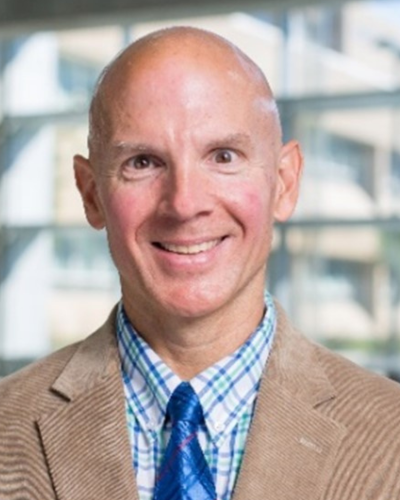
Mark B. Shiflett is a Foundation Distinguished Professor in the Department of Chemical and Petroleum Engineering at the University of Kansas (KU). He is the director of the Environmentally Applied Refrigerant Technology Hub (EARTH), a new National Science Foundation Engineering Research Center. He is also the director of the Wonderful Institute for Sustainable Engineering at KU and editor-in-chief for “Journal of Ionic Liquids.” He is co-founder and chief science officer for two companies, Icorium Engineering Company and Pvera Tech, LLC. Professor Shiflett joined KU in August 2016 after retiring from the DuPont Company, where he was a Technical Fellow in the Central Research and Development organization at the Experimental Station in Wilmington, Del. Professor Shiflett was also an adjunct professor at the University of Delaware in the Department of Chemical and Biomolecular Engineering.
Dr. Shiflett is an inventor on 48 U.S. patents and has published 150 articles with over 10,000 citations. He was awarded the DuPont Bolton Carothers award in 2005, the ACS Hero of Chemistry award in 2006 and the University of Delaware presidential citation in 2007 for his development of hydrofluorocarbon (HFC) refrigerant mixtures to replace ozone-depleting chlorofluorocarbons.
Dr. Shiflett was elected in 2014 to be a Fellow in the American Institute of Chemical Engineers, in 2016 to be a Division Fellow in the American Chemical Society and in 2018 to be a Fellow in the National Academy of Inventors. Professor Shiflett received the American Institute of Chemical Engineers Institute award for Industrial Research in 2016 for the development of non-ozone-depleting refrigerants, new applications using ionic liquids, and mentoring and educating chemical engineers.
Presentation Abstract:
Environmentally Applied Refrigerant Technology Hub (EARTH)— a New NSF Engineering Research Center
This presentation will provide an overview of the Environmentally Applied Refrigerant Technology Hub (EARTH), a new U.S. National Science Foundation (NSF) Engineering Research Center. Heating, ventilation, air conditioning and refrigeration (HVAC&R) are essential to human quality of life but exact a significant environmental toll. Most current refrigerants are high–Global Warming Potential (GWP) HFCs with up to 4,000 times the impact of CO2. High HVAC&R-associated energy consumption and HFC leaks account for 7.8% of total greenhouse-gas emissions.
EARTH will use a team-science approach to bring together talent in engineering, architecture, business, chemistry, economics, geography, history, law, psychology and entrepreneurship to create convergent technical and societal solutions with industry partners, technical and community colleges, professional organizations, regulators, and end users. EARTH’s vision is to create a transformative “sustainable refrigerant lifecycle” to address the HVAC&R ecosystem’s key technical and societal challenges: (1) lowering HFC emissions, (2) creating safe, property-balanced replacement refrigerants and (3) increasing HVAC&R energy efficiency. In addition, EARTH will work toward increasing the number of HVAC&R engineering researchers and will involve community and technical colleges to address workforce gaps through coordinated outreach and training with community and technical colleges.
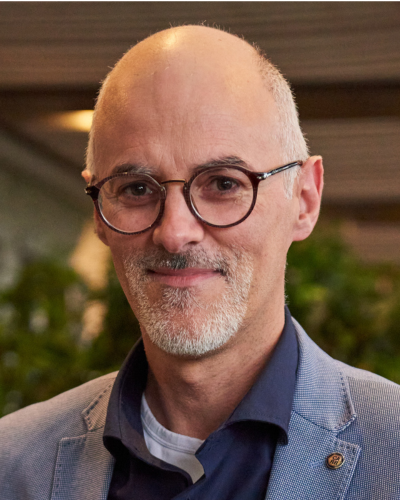
Claudio Zilio is a mechanical engineer and is a Full Professor at the University of Padova in Italy, where he teaches the courses “Applied Thermodynamics” and “Thermal Systems.” He has been involved with several European research projects, primarily concerning refrigeration technology and heat transfer, and he is the author or co-author of more than 200 papers dealing with topics such as thermodynamics of inverse cycles; heat transfer, both theoretical and technological aspects; energy applications related to HVAC of buildings; refrigeration for foodstuff preservation; and refrigerating equipment.
Dr. Zilio is a member of the editorial board of ASHRAE's "Science and Technology for the Built Environment" journal. He is secretary of International Institute of Refrigeration Commission B2 and president of AiCARR, the Italian Association for Air Conditioning, Heating and Refrigeration.
Presentation Abstract:
Chasing Low-GWP Refrigerants From a Heat Transfer Perspective
The search for sustainable low–Global Warming Potential (GWP) refrigerants is fundamental in the roadmap toward the decarbonization of the Refrigeration, Air Conditioning, Heat Pumps (RACHP) sector. In the present scenario, the CO2-equivalent emissions caused by energy consumption of the RACHP sector are roughly twice the direct impact linked to the GWP of the refrigerant. The mandatory goal of minimizing the energy consumption of vapor compression systems can be pursued through the optimization of the heat exchangers design driving the reduction of the compression work for a specific refrigerant and application. Dr. Zilio will discuss the thermophysical properties of several low-GWP synthetic or natural fluids. He'll present the available data in the literature in flow condensation and boiling, and will analyze different semi-empirical calculation models for heat transfer coefficient and pressure drop. Finally, he’ll share how the use of suitable performance evaluation criteria implemented for in-tube flow condensation and boiling can guide the optimal design of the condensers and evaporators for a given fluid and application.

